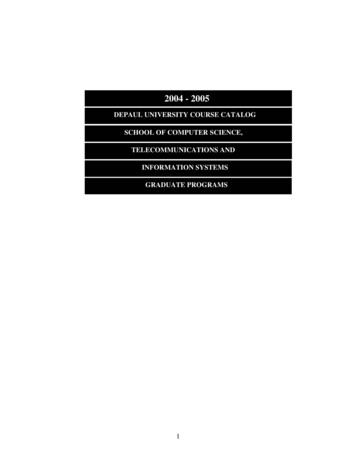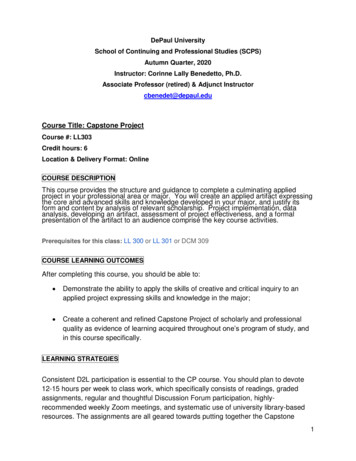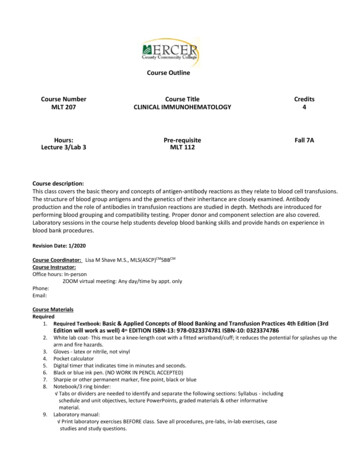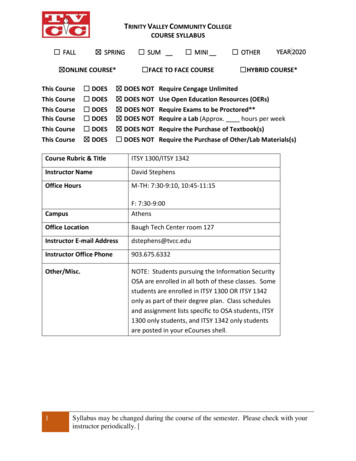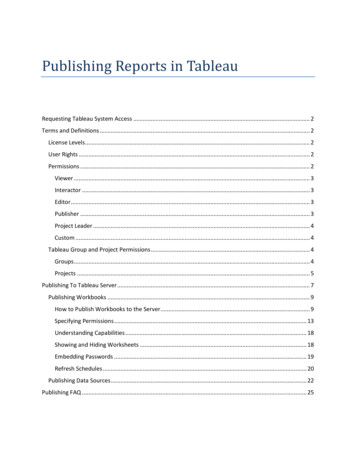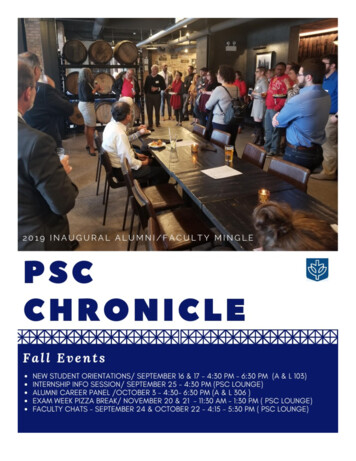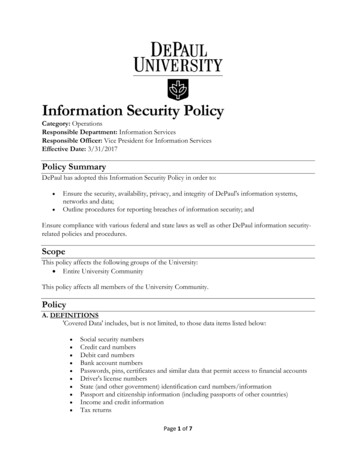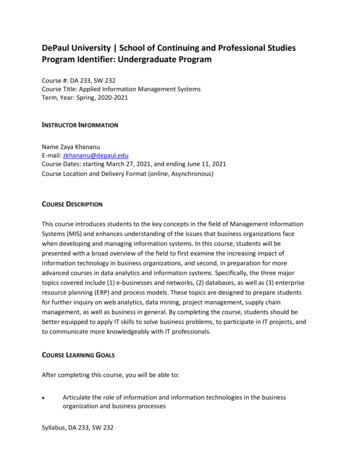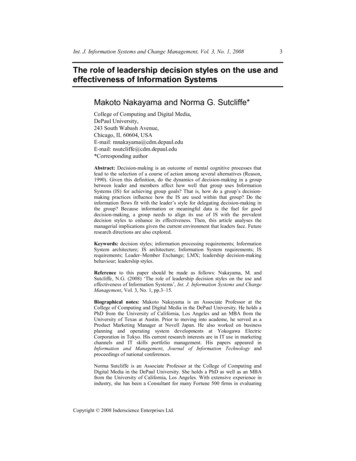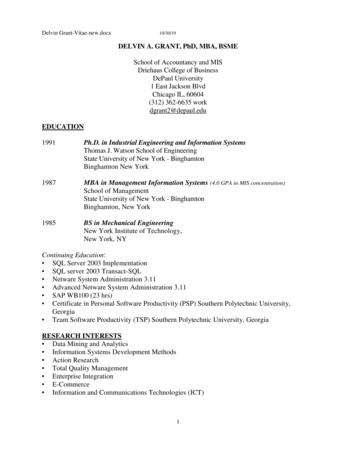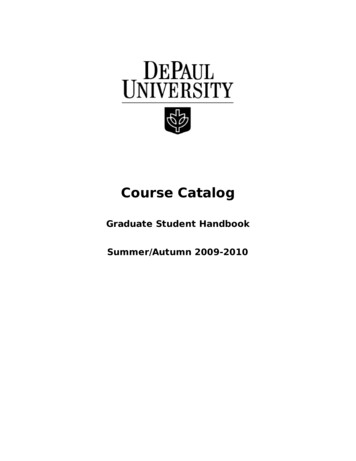
Transcription
Course CatalogGraduate Student HandbookSummer/Autumn 2009-2010
Table of ContentsTable of ContentsGraduate Student Handbook25Effective Date for this Handbook5Effective Date for this HandbookUniversity InformationAbout This HandbookAbout DePaulAdmissionDePaul CampusesSchools and CollegesVincentian CharacterUniversity OfficersAccreditation and Honor SocietiesTen Learning GoalsStatement on Academic AdvisingTuition and FeesFinancial AidScholarshipsVeterans AssistanceAcademic Calendar 2009-2010Graduate Academic PoliciesGeneral InformationAcademic IntegrityAdmissionDismissal/ReadmissionEvaluation and CreditEvaluation and Credit/LimitationsFERPA/Annual NotificationGradesGrades, Challenges toGrades, Incomplete Expiration PolicyGraduation, Commencement CeremonyGraduation, Degree Conferral PolicyGraduation RequirementsGraduation with HonorsImmunization, Proof ofProbationRegistrationRegistration, Student Enrollment ClassificationsRequirement TermTranscriptsTuition PolicyWithdrawalCode of Student ResponsibilityGeneral InformationStudent RightsNotification of FERPA RightsIntroduction to the Code/PoliciesAlcoholCivil or Criminal LawDamage to Personal or Private PropertyDemonstrationsDisorderly, Violent, Intimidating or Dangerous Behavior to Self or OthersDrug Free Schools and Community 6262627272728292929303132323434353637373738
Emergency RegulationsFalse InformationFalse Report of an EmergencyFirearms, Dangerous Weapons, Explosives or FireworksGamblingGuest Responsibility and VisitationHazingIllegal Use or Possession of Controlled SubstancesInformation DisplayJudicial Process ComplianceReasonable Directives from a University Official or OfficeResidential Living and Housing Services Policies and ProceduresSafety EquipmentSexual OffenseTheft, Misappropriation, Misrepresentation or Unauthorized Sale or UseTravelUnauthorized Entry or Exit from University FacilitiesUniversity GraphicsUNIVERSITY POLICIES APPLICABLE TO STUDENTSAcceptable Use Policy/Network SecurityAnti-Discriminatory HarassmentPolitical Campaign Activities PolicySales and Solicitation- Residence HallsSexual Harassment PolicySmoking PolicySpace ReservationsOTHER IMPORTANT INFORMATIONClery ActEmergency ContactsDisciplinary Process ComplianceHIV/AIDS GuidelinesInformation Regarding Registered Sex OffendersInvoluntary WithdrawalSpeakers GuidelinesStudent OrganizationsJUDICIAL REVIEW PROCESSStudent Rights Within the Judicial Review ProcessUniversity Rights Within the Judicial ProcessMediationOther University Processes Including Residential EducationJudicial RecordsStudent Disciplinary ActionGeneral Information about the Judicial Review ProcesJudicial Board Hearing ProcessJudicial SanctionsJudicial Appeal ProceduresExplanation of Important Aspects of the Judicial Review ProcessFrequently Asked QuestionsRegistration and Related ActivitiesDegree Requirements, Academic Planning, and SupportPersonal SupportDePaul s College OfficesUniversity ResourcesAdult and Suburban Student ServicesCareer CenterCollege OfficesDean of Students OfficeFinancial FitnessHealth 65676768686969707070717272
Housing ServicesLibrariesOffice of Multicultural Student AffairsOffice of Students with DisabilitiesPLuS ProgramStudent AffairsStudent LifeTechnology Resources7272737373747474
Graduate Student HandbookEffective Date for this HandbookGraduate Student Handbook (NEW) Graduate Student Handbook Effective Date for this HandbookEffective Date for this HandbookU NDERGRADUATE U PDATE: JUNE 15, 2009The policies contained in this handbook are effective beginning autumn term 2009.University InformationGraduate Student Handbook (NEW) Graduate Student Handbook University InformationAbout This HandbookThe Handbook is a supplement to the University catalogs. The catalogs provide degreeoptions and requirements. The Handbook provides University policies that support bothacademic and behavior expectations.The University reserves the right to change programs, courses and requirements; and tomodify, amend or revoke any rules, regulations, policies, procedures or financial schedules atany time during a student's enrollment period provided.In addition to the policies and information included in this Handbook, your college or schoolmay have specific guidelines, policies, and procedures for which you are responsible. Pleaseconsult your college catalog.The Handbook also includes sections on General Information and University Resources, withlinks to a wealth of useful information about DePaul. To see the full list of topics, click onone of these headings in the left-hand column.Graduate Student Handbook (NEW) Graduate Student Handbook University Information About DePaulAbout DePaulDePaul University was founded in 1898, by the Congregation of the Mission (or Vincentian)religious community, which follows the teachings of 17th century French priest St. Vincent dePaul. The university's mission emphasizes academic excellence, service to the community,access to education and respect for the individual.DePaul University is the nation's largest Catholic institution of higher education and is theninth largest private, not-for-profit university in the nation. Of the 10 largest privateuniversities, all except DePaul are classified as "research extensive" universities, makingDePaul the nation's largest university with a primary mission of teaching and service.
DePaul University uses the quarter system of class scheduling, offers more than 200undergraduate and graduate programs of study. The five most popular undergraduate majorsare: communications, psychology, accounting, political science and finance. The five mostpopular graduate majors are: computer science, elementary education, information systems,finance, and public service.Learn moreGraduate Student Handbook (NEW) Graduate Student Handbook University Information AdmissionAdmissionAdmission to graduate programs is determined by each individual graduate program. Pleaseconsult the catalog of the respective college for additional information. For generalinformation or to apply to a graduate program consult the Office of Admission website .Graduate Student Handbook (NEW) Graduate Student Handbook University Information DePaul CampusesDePaul CampusesDePaul Campuses:The Lincoln Park Campus is situated about three miles north of the Chicago Loop in thevicinity of Webster (2200 N), Halsted (800 W) and Racine (1200 W). The graduate officesfor: the College of Liberal Arts and Sciences, the School of Music, the School of Education, theCollege of Communication, and The Theatre Schoolare located on the Lincoln Park campus.The Loop Campus is located at 1 East Jackson Boulevard, between State, Jackson andWabash. The graduate offices for: the College of Commerce, the College of Computing andDigital Media and the School for New Learning are located on the Loop Campus.In addition some courses are available at the following suburban sites:The Naperville Campus is located at 150 W. Warrenville Road, Naperville, Illinois (at I-88and Naperville Road).The O Hare Campus is located near O Hare Airport at 3166 River Road, Des Plaines, Illinois(at the intersection of Devon Avenue and River Road).The Rolling Meadows Campus is located at 2550 W. Golf Road in Rolling Meadows,Illinois.The Oak Forest Campus is located at South Suburban Community College s University andCollege Center, 16333 South Kilbourn Avenue, Oak Forest, Illinois (at I-57 and 167th street).Graduate Student Handbook (NEW) Graduate Student Handbook University Information Schools and CollegesSchools and Colleges
Charles H. Kellstadt Graduate School of BusinessCollege of Liberal Arts & SciencesCollege of CommunicationCollege of Computing and Digital MediaCollege of LawSchool for New LearningSchool of EducationSchool of MusicThe Theatre SchoolGraduate Student Handbook (NEW) Graduate Student Handbook University Information Vincentian CharacterVincentian CharacterDePaul takes its name from Saint Vincent de Paul, a French priest who lived in the 17 thcentury. The "Vincentian" religious community founded by St. Vincent established theuniversity and endowed it with a distinctive spirit: to foster in higher education a deeprespect for the God-given dignity of all persons, especially the materially, culturally, andspiritually deprived; and to instill in educated persons a dedication to the service of others.The people of DePaul University have retained this unique spirit as a highly valued heritageand vital influence in every succeeding generation of the university's development.To learn more.Graduate Student Handbook (NEW) Graduate Student Handbook University Information University OfficersUniversity OfficersRev. Dennis H. Holtschneider, C.M., Ed.D.PresidentRev. John T. Richardson, C.M., S.T.D.ChancellorHelmut P. Epp, Ph.D.ProvostRobert L. Kozoman, C.P.A.Executive Vice PresidentRev. Edward R. Udovic, C.M., Ph.D.Secretary of the University
Complete listing of officers .Graduate Student Handbook (NEW) Graduate Student Handbook University Information Accreditation and Honor SocietiesAccreditation and Honor SocietiesInstitutional Accreditation:DePaul University is accredited by the The Higher Learning commission of the North CentralAssociation of Colleges and Schools (NCA)Programmatic/ Specialized Accreditation:AACSB International -The Association to Advance Collegiate Schools of BusinessABA - The American Bar AssociationACS - The American Chemical SocietyAPA - The American Psychological AssociationAALS- The Association of American Law SchoolsNASM- The National Association of Schools of MusicNCATE - The National Council for Accreditation of Teacher EducationNLN- The National League for NursingNASPAA - The National Association of Schools of Public Affairs and AdministrationDePaul University Is On The Approved List ofThe Illinois Board of Higher EducationThe Illinois Department of Registration and EducationThe Illinois Office of Education, State Teacher Certification BoardThe State Approving Agency for Veterans TrainingDePaul University Is A Member ofThe American Association of Colleges of NursingThe American Association of Colleges for Teacher EducationThe American Association of Higher EducationThe American Association of Theatre for YouthThe American Association of University WomenThe American Council On EducationThe Association of AmericanColleges and UniversitiesThe Association of CatholicColleges and UniversitiesThe Association of Governing Boards of Universities and CollegesThe Chicagoland Advocates for Signed TheatreThe Consortium of Conservatory ProgramsThe Council for Adult and Experiential LearningThe Council of Graduate SchoolsThe Federation of IndependentIllinoisColleges and UniversitiesThe Illinois Arts AllianceThe Illinois League for NursingThe International Association of Theatre for Children and Young PeopleThe League of Chicago TheatresThe Midwest Alliance in NursingThe National Association of Independent Colleges and UniversitiesThe National Catholic Education AssociationThe National Council of Educational Opportunity AssociationsThe National Council on Rehabilitation EducationThe Nonprofit Academic Centers CouncilHonor SocietiesAlpha Lamba DeltaBeta Alpha PsiBeta Gamma SigmaDelta Mu Delta
Delta Mu DeltaDelta Sigma PiGolden Key National Honor SocietyOmnicron Delta EpsilonOrder of The CoifPhi Alpha DeltaPhi Alpha ThetaPhi Beta DeltaPhi Delta KappaPhi Kappa DeltaPhi Kappa PhiPi Kappa LambdaPi Sigma AlphaPsi ChiSigma Delta PiSigma Pi SigmaSigma Theta TauSigma XiTheta Alpha KappaGraduate Student Handbook (NEW) Graduate Student Handbook University Information Ten Learning GoalsTen Learning GoalsGraduates of DePaul University are expected to have accomplished the following learning goals:1. M astery of content .2. A rticulate communication.3. C apacity to work toward accomplishing goals both independentlyand cooperatively.4. K nowledge of and respect for individuals and groups who are differentfrom themselves.5. D evelopment of service-oriented, socially responsible value ande thical framework.6. C ritical and creative thinking.7. D evelopment of multiple literacies.8. A personal arts and literature aesthetic in formation.9. S elf-reflection/life skills.10. H istorical consciousness.These University-wide goals do not exhaust the learning goals pursued at DePaul. Notably, they donot explicitly refer to the expectations specific to the various schools and departments. Nor will theybe pursued in the same manner nor to the same degree in every unit. Nevertheless, the educationof all recipients of DePaul undergraduate degrees should be characterized by these goals along withthe goals specific to the student's unit.Since graduate and professional schools encounter students at different stages of their educationand at different levels of maturity, their approaches to these goals and their methods of measuringthem will have to be adjusted accordingly.For more details.Graduate Student Handbook (NEW) Graduate Student Handbook University Information Statement on Academic AdvisingStatement on Academic AdvisingAcademic Advising at DePaul helps students achieve their educational, personal, and careergoals by providing guidance and assistance in the decision-making process. AcademicAdvising is most effective when all participants anticipate their future needs, commit to theprocess, do their part, and then reflect on their results. Students should work closely withtheir advisors to plan workable educational goals, to understand the degree options and
their advisors to plan workable educational goals, to understand the degree options andrequirements, to understand the financial implications of their decisions, to assess theirstrengths and challenges as scholars, and to clarify realistic career objectives for themselvesupon graduation.Students bear ultimate responsibility for decisions and actions that determinetheir success at DePaul University.Students will make informed decisions and register for classes on time.Students will obtain the necessary information for course selection and planning intheir individualized programs.Students will make and keep appointments with their advisors.Students will communicate honestly and fully in these advising discussions.Students will regularly reflect on the consequences, both academic and financial, oftheir decisions as they progress in their academic careers toward life choices.Advisors are responsible for helping students improve their decision making skills.Advisors guide students through this learning process during regular interactions at keypoints during their academic careers.Advisors will be available on a regular basis for consultation and encourage students tomake and keep regular advising appointments.Advisors will monitor their advisees academic progress.Advisors will encourage students to consult available material related to their programand career choice.Advisors will encourage students to reflect on the academic and financialconsequences of their decisions about degree programs and course-taking plans.Advisors will assist students to set realistic career goals that extend beyond their timeat DePaul.Advisors will encourage students to incorporate their basic values and beliefs into theirdecision making process.The university is responsible for providing the infrastructure for students, faculty,and staff to support effective advising.The university will provide the information that students and their advisors need tomake informed and timely decisions.The university will provide adequate resources of personnel, funding and facilities tosupport the advising process.The university will clearly communicate to advisors and students the policies andoptions regarding student financial aid.The university will regularly evaluate the policies and procedures surrounding advisingto improve the advising process on an ongoing basis.The university will provide training to help both advisors and students work moreeffectively together.The university will acknowledge the important contribution advisors make byrecognizing advising within the institutional reward system.Graduate Student Handbook (NEW) Graduate Student Handbook University Information Tuition and FeesTuition and FeesTuition and FeesDePaul University provides a world-class, yet affordable, education. We believe theeducational experience here enables students to enjoy the long-term benefits of investing inthemselves -- and in their future.
DePaul seeks to manage its resources effectively in order to control the costs it chargesstudents for programs and services. Recent tuition increases have been held to between 3and 5 percent.Complete DePaul tuition rates are available on the Student Accounts website. Tuition policyinformation is available in the policy section of this handbook.Graduate Division 2009/2010Please Note: Graduate Students are assessed tuition according to their academic program. Exceptions do exist for CDM and Kellstadt courses. Graduate students who are notenrolled in CDM and/or Kellstadt, may want to contact DePaul Central Office, at 312-3628610, for details before enrolling in the CDM and Kellstadt courses.Full-time and Part-time, Tuition per credit hourCommunication 570.00Computing & Digital Media 655.00Education 520.00Kellstadt Graduate School of BusinessGraduate Busines, per credit hour 830.00Liberal Arts & Sciences 550.00Music 665.00School for New Learning 510.00Theatre 665.00TheatreGraduate, guaranteed package - Class entering 2007 25,620.00Graduate, guaranteed package - Class entering 2008 26,900.00Graduate, guaranteed package - Class entering 2009 27,975.00College of LawClass entering 2007, full-time day guaranteed 3-year package (12-16 credit hours) 32,960.00Class entering 2008, full-time day guaranteed 3-year package (12-16 credit hours) 35,400.00Class entering 2009, full-time day guaranteed 3-year package (12-16 credit hours) 37,525.00Law, part-time evening package (9-12 credit hours) 24,380.00All other, per credit hour 1,230.00Rates are subject to change without prior notice.Students who are not admitted by the College of Computing and Digital Media (CDM) andenrolled in 300-level CDM courses may be subject to the tutition rate of the academicprogram in which they are admitted.Graduate Student Handbook (NEW) Graduate Student Handbook University Information Financial AidFinancial AidAll students who apply for financial aid must meet certain requirements in order to receivefinancial aid. You must be admitted to a degree or eligible certificate or graduate preparatoryprogram and be enrolled in that program at least half-time. Classes audited or incompletecourses completed in addition to your program coursework are not considered as enrollmentfor financial aid purposes.
In addition to these enrollment requirements, you must also:be a U.S. citizen or eligible non-citizen;make academic progress in your course of study;not be in default on any federal loan or owe a repayment on any federal grant, and;comply with all federal regulations governing selective service registration and use offunds for educational purposes.Additional information is available on the Financial Aid website .Graduate Student Handbook (NEW) Graduate Student Handbook University Information ScholarshipsScholarshipsScholarships and assistantships are awarded at the program level. Please consult yourcollege or school for additional information.Graduate Student Handbook (NEW) Graduate Student Handbook University Information Veterans AssistanceVeterans AssistanceFinancial Aid handles the following VA educational benefit programs:The new "Montgomery" GI Bill for those who enlisted after July 1, 1985The Selected Reserve Educational Assistance Program (Chapter 106), part of the new GIBill effective July 1, 1985The Dependents Educational Assistance Program (Chapter 35) for
consult your college catalog. The Handbook also includes sections on General Information and University Resources, with links to a wealth of useful information about DePaul. To see the full list of topics
